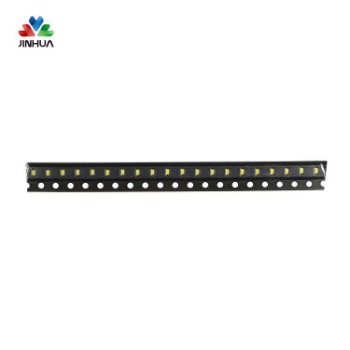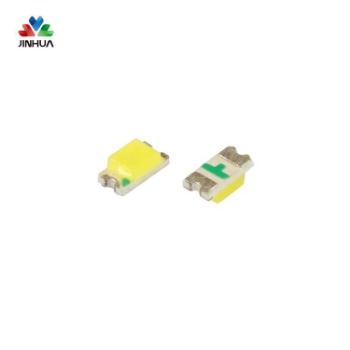LED SMD significa diodo emisor de luz de montaje superficial. Los parches SMD ayudan a mejorar la eficiencia de la producción y se aplican en diferentes instalaciones. Es un dispositivo semiconductor de estado sólido que puede convertir directamente la electricidad en luz.
Introducción
LED SMD significa diodo emisor de luz de montaje superficial. Los parches SMD ayudan a mejorar la eficiencia de la producción.
y diferentes aplicaciones de instalaciones. Es un dispositivo semiconductor de estado sólido que puede convertir directamente la electricidad en luz. Su voltaje es de 1,9-3,2 V, siendo la luz roja y la luz amarilla las que tienen el voltaje más bajo. El corazón del LED es un chip semiconductor. Un extremo del chip está unido a un soporte, un extremo es el electrodo negativo y el otro extremo está conectado al electrodo positivo de la fuente de alimentación, de modo que todo el chip está encapsulado con resina epoxi. La oblea semiconductora se compone de dos partes. Una parte es un semiconductor de tipo P, en el que predominan los huecos, y el otro extremo es un semiconductor de tipo N, donde están presentes principalmente los electrones. Pero cuando estos dos semiconductores se conectan, se forma una unión P-N entre ellos. Cuando una corriente eléctrica actúa sobre este chip a través de un cable, los electrones serán empujados a la región P, donde se recombinarán con los agujeros, y luego se emitirá energía en forma de fotones. Este es el principio de la luminiscencia LED. La longitud de onda de la luz, es decir, el color de la luz, está determinada por el material que forma la unión P-N.
Modelo principal
LED SMD 3528
3528 perlas de lámpara SMD, potencia 0,06 w, valor lúmenes 6-7 LM, 7-8 LM, 8-9 LM, la eficiencia luminosa máxima puede alcanzar 150 LM/w.
LED SMD 2835
2835 perlas de lámpara SMD, potencia 0,2 W, valor de lúmenes 20-22 LM, 22-24 LM, 24-26 LM, la eficiencia luminosa máxima puede alcanzar 130 LM/w.
LED SMD 5050
Cuentas de lámpara SMD 5050, potencia 0,2 W, valor de lúmenes 20-22 LM, 22-24 LM, 24-26 LM, la eficiencia luminosa máxima puede alcanzar 130 LM/w.
LED SMD 5630
Cuentas de lámpara SMD 5630, potencia 0,5 w, valor lúmenes 50-55 lm, 55-60 lm, la eficiencia luminosa máxima puede alcanzar 130 lm/w.
LED SMD 3014
Cuentas de lámpara SMD 3014, potencia 0,1 W, valor lumínico 11-12 LM, 12-13 LM, la eficiencia luminosa máxima puede alcanzar 130 LM/w.
Comparar
Primero, comprendamos los conceptos de LED y SMD.
LED (diodo emisor de luz) es un diodo emisor de luz. Hay muchos tipos, uno de los cuales es el LED SMD. Otros incluyen LED de conexión directa, piraña, LED de alta potencia, etc. Los LED empaquetados en formato SMD se dividen en varios tipos, como CHIP, TOP, SIDEVIEW, etc.
Clasificación
Los LED de uso común se dividen en cuatro tipos: LED enchufable, TOPLED, piraña y de alta potencia.
1) LED de conexión directa:
La conexión eléctrica se realiza mediante enchufe directo de 2 pines, que es un producto tradicional de gama baja. Debido a que la resistencia térmica del paquete es grande, al chip le resulta difícil disipar el calor, por lo que el efecto de la luz disminuye rápidamente y la vida útil es corta. La ventaja es que es económico y se puede convertir en un pequeño ángulo de luz.
2) DERROPADO:
La conexión eléctrica se realiza mediante un parche de 2, 4 o 6 pines, que es una fuente de luz de uso común actualmente. Según el tamaño de la apariencia del paquete, se divide en especificaciones como 0805, 1206, 3528, 3535, 5050, 5060, etc. Cuanto mayor sea la apariencia del paquete, mejor será el rendimiento de disipación de calor y mayor será la potencia que puede soportar. , y más energía luminosa puede producir.
3) Piraña:
Es un paquete de conexión directa de 4 pines. Su rendimiento de disipación de calor y su confiabilidad son mejores que los del tipo enchufable normal de 2 pines. Puede soportar una corriente operativa de 50 ~ 70 mA y actualmente es una fuente de luz de uso común.
4) LED de alta potencia:
Los LED diseñados y producidos utilizando chips de gran tamaño y tecnología de canal térmico mejorada generalmente se dividen en especificaciones como 0,5 W, 1 W, 3 W y 5 W. Un solo LED de 1 W puede soportar una corriente operativa de más de 300 mA y generar un flujo luminoso de más de 100 lúmenes. Es ampliamente utilizado en iluminación civil y comercial, control de transporte, fotografía, visión nocturna y otros campos. El precio de los LED de alta potencia sigue siendo relativamente alto. A medida que la tecnología madure gradualmente, se espera que reemplace por completo las fuentes de iluminación tradicionales y lleve al mundo a una era de fuentes de luz sólidas.






 English
English Deutsch
Deutsch русский
русский español
español العربية
العربية



 IPv6 RED SOPORTADA
IPv6 RED SOPORTADA
